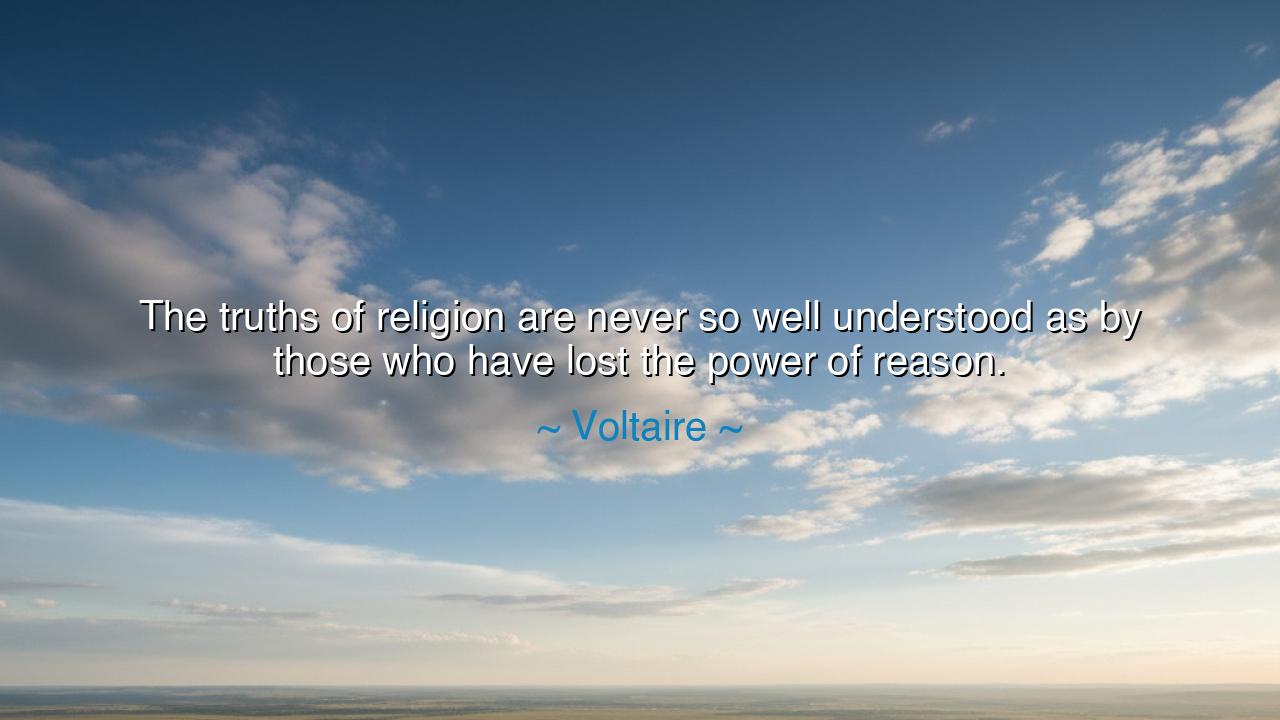
The truths of religion are never so well understood as by those
The truths of religion are never so well understood as by those who have lost the power of reason.






"The truths of religion are never so well understood as by those who have lost the power of reason." These words, uttered by the sharp-witted Voltaire, cut to the heart of a profound human paradox: the pursuit of faith and reason often exist in tension, yet it is sometimes in the absence of rationality that the most fervent beliefs are born. Voltaire, a beacon of Enlightenment thinking, recognized that religion, in its purest form, could be misunderstood or misinterpreted when it is divorced from reason. When the mind falters, when rationality gives way to blind faith, the truths of religion are often not only more readily accepted but are also embraced without the critical questioning that reason demands.
In the great traditions of philosophy, there has always been a tension between faith and reason. Socrates, the philosopher who made his name questioning everything, believed that true wisdom came not from blind adherence to tradition but from the search for knowledge. Yet, in his time, the gods were seen as the ultimate authorities, and reason had to navigate the stormy seas of divine belief. Similarly, Plato, in his dialogues, often pointed to the limitations of human perception, suggesting that reason alone could lead to deeper truths. But even Plato recognized that certain religious truths could only be grasped by those whose reason was tempered by a deeper sense of the divine. Voltaire, however, observed that too often the absence of reason leads not to deeper understanding, but to dogma and blind belief, where truths are accepted without question, and faith becomes an unquestioning submission.
Consider the example of Joan of Arc, the French heroine who led an army to victory against the English in the Hundred Years' War. Joan, a deeply religious woman, believed she was guided by divine visions and voices. To those who followed her, her fervent faith in her religious convictions seemed to transcend the powers of reason. Joan's experience illustrates what Voltaire meant: she lost the ability to reason in a conventional sense, but in doing so, her faith became a powerful force—enough to inspire an army to victory. Yet, the very same faith that led to her greatness ultimately led to her downfall. Joan was captured, and her religious fervor was used against her during her trial. Her inability to justify her visions with reason left her vulnerable, as those in power used her lack of rational argument to condemn her. In this sense, Voltaire’s assertion speaks to the double-edged sword of losing reason in the pursuit of religious truths: it can offer both empowerment and destruction.
In the modern world, we see the implications of Voltaire’s insight in the continued conflict between science and faith. As we move toward a world increasingly shaped by technology and rationality, we find many who cling to faith in the absence of reason, or who reject reason altogether in favor of religious fervor. In these instances, people often accept religious teachings not because of their logical coherence but because they provide certainty, comfort, and a framework to explain the mysteries of life. Voltaire’s words, in this light, remind us that reason, when lost or abandoned, allows people to accept doctrines without critical engagement, thus making them susceptible to manipulation and blind obedience.
Throughout history, martyrs and fanatics have often acted on faith without the guiding light of reason. Take, for example, the crusaders of the Middle Ages, who waged war in the name of religion, convinced of their divine mandate to conquer and convert. The absence of reason in their minds turned their religious zeal into something dangerous and destructive. They believed they were serving a higher purpose, yet they were blinded by their unquestioning faith. This blind faith, far from leading to deeper understanding, often led to violence, suffering, and injustice, reminding us of Voltaire's warning that without reason, religion can become a force that distorts rather than illuminates.
The lesson from Voltaire’s words is a powerful one. Faith and reason are not enemies but partners. Religion should be a source of comfort, guidance, and truth, but it must be approached with the sharpness of reason to prevent it from becoming a tool of blind obedience. When we lose the ability to question, we lose our freedom to seek the truth. Reason does not invalidate faith; rather, it enhances and deepens it, allowing us to approach religion with an open mind and a clear heart. We must strive to question, to reflect, and to engage with our beliefs, not as passive followers, but as active seekers of truth.
Thus, the practical action for us is to always marry faith with reason, to hold our beliefs loosely enough that we are willing to challenge them when the need arises, but firmly enough that we do not lose the moral compass they provide. Voltaire’s insight encourages us to embrace our capacity for reason, to engage in thoughtful dialogue, and to never allow our beliefs to become a dogmatic prison. In this balance, we find a way to live with both conviction and clarity, grounded in faith but guided by reason, walking the path of wisdom.






AAdministratorAdministrator
Welcome, honored guests. Please leave a comment, we will respond soon